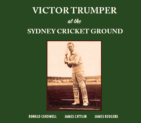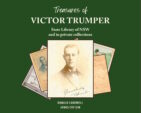Amazing Grace
Archie Mac |Published: 2015
Pages: 413
Author: Tomlinson, Richard
Publisher: Little Brown
Rating: 4.5 stars

‘And the winner is Birdman’ – not a bad movie but not the best of the year, although I can see why the critics chose it as best picture of 2014. Birdman had a point of difference and if you watch as many movies as critics do than you must crave new techniques. The fact that it’s different from the norm doesn’t mean that the majority of movie goers will care about the points of difference. The average punter just wants to be entertained.
I wonder if this is the same with W.G. Grace and this book reviewer. I have read so many books and other articles on the great man that I crave any new information or even known information reinterpreted. Amazing Grace has several points of difference from previous works on Grace, which made for a real page turner. Just not sure if someone reading about Grace for the first time needs the reinterpretations that the author offers? But in the end you can only review a book based on what’s written on the pages and there are plenty of opinions on offer in Amazing Grace.
While most won’t agree with all of Tomlinson’s opinions and interpretations, they certainly make the reader reconsider Grace the cricketer and the man. Those with preconceived ideas of Grace as an overweight cheat and condescending blue blood aristocrat will quickly be disabused. Well mostly. As Tomlinson admits he came to realise, to his disappointment, that Grace was in fact a snob. This realisation was established by Grace’s treatment of the pros on his first trip to Australia as captain.
This is not the typical cricketing biography where we start with the childhood and then progress through first class debut and onto each Test series. Instead the author explores themes such as why it took so long for Grace to be made a member of the MCC despite his huge scores providing the main finances for the club. The relationship between Grace and the secretary of the MCC, Robert Fitzgerald, is dissected to a much larger extent than previously researched. Fitzgerald’s dissent into madness makes for fascinating reading.
A major theme throughout the book is Grace’s shamateur status and how much he made from the game. His money worries, brought on in part by his own lack of financial acumen, perhaps provide the greatest insight to some of the more unsavoury incidents during his playing career. His concerns over his medical practice, which he neglects in favour of cricket throughout his career, add to his money worries. Grace was also poor at understanding his value outside of playing, when it came to commercial opportunities. For example there is no record Grace saw anything from the very successful Coleman’s Mustard campaign.
The author also contributes more detailed research on Grace’s family, and although we learn more about his wife than from previous works there is still not too much shed on the personality of Agnes. This was contributed to by his wife destroying all correspondence between her and WG. The couple had a lot of misfortune with two children dying – a son in early adulthood and a daughter as a teenager. These misfortunes and their impact on Grace are dealt with compassionately. The passages on the loss of his teenage daughter will bring a tear to the eye of even the harshest critics of W.G.
On reflection, this book deserves to be read by the masses as well as those who thought they already knew the Grand Old Man. You will acquire a real understanding of the man and why he behaved as cantankerously, on occasions, as he did. Highly recommended.






Leave a comment